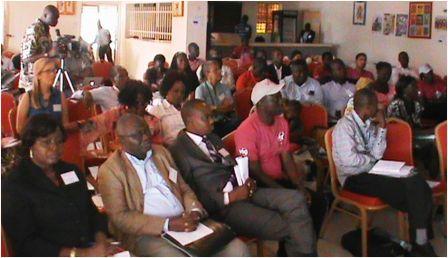VSO Disseminates Research Findings Report of Impact of Ebola Virus Disease on Delivery of Routine Maternal Health Services
Freetown, Sept. 6, 015 (MOHS) – Volunteers Service Overseas (VSO) Sierra Leone has disseminated its Research Findings Report of Ebola Virus Disease on delivery of Routine Maternal Health Services and Situational Analysis of levels of stress among health workers providing emergency obstetric care in Sierra Leone at a ceremony held at the Sierra Light House in Freetown. Cross section of stakeholders
The institution VSO, is the world’s leading independent international development organization that works through volunteers to fight poverty in developing countries. It brings people together to share skills, build capacities and promote international understanding and action. The organization also works with partner institutions at every level of society, from government organizations at a national level to health and education facilities at a local level.
The Report which is prepared by the Research team of Liverpool School of Tropical Medicine was conceptualized by VSO and finalized after discussion with the Ministry of Health and Sanitation Directorate of Reproductive and Child Health and the government of Sierra Leone. The Research is financially supported by VSO, Ebola Appeal Fund and Water Aid International. The focus is on appropriate data collection, availability of health care workers, uptake services, maternal and newborn mortality, provision of signal functions, infection prevention and control, available Water and Sanitation Health (WASH) facilities and key informant interviews.
Launching the Report, Deputy Health and Sanitation Minister I (one), Mr. Foday Sawi described VSO as a versatile partner of the Health Ministry, adding that over the years collaborated with various Directorates and departments within the Ministry. The organization also works with all the 13 District Health Management Teams supporting them to set up structures, systems and processes.
The findings of each of the studies, the Deputy Minister noted unveiled gaps and weaknesses both in the systems and structure of the country’s health sector, and encouraged the Ministry’s technical team and partner organizations to critically dissect the findings and identify cost-effective actions that would strengthen the health care delivery systems and services. Operations research unlike academic research, Mr Sawi said must generate actions that add value to the institutions in which the study was undertaken, adding that such research could also be used to generate data that could be used to facilitate informed decision making, support quality planning, and ensure timely advocacy..
In his remarks, VSO Sierra Leone Country Director, Peter Nderitu reiterated that the research was done with Liverpool School of Tropical Medicines with support from Ministry of Health and Sanitation Ethics Committee, pointing out that training, monitoring, investment for the wellbeing of front line health workers was a concern. For lessons drawn from the survey, the Health Ministry’s National Health Sector Strategic Plan relating to accessibility of services to mothers and children within the framework of the post Ebola Recovery Plan, Peter Nderitu said would be judiciously use to ascertain the collaborative efforts and strides in bringing the current Ebola situation to zero.
He congratulated the leadership of the government of Sierra Leone, the Health Ministry and other organizations for the enormous work in supporting the research.
Maternal Child Health Aide frontline health worker of the Gbaama, Jaiama Gbongo chiefdom Bo district, Community Health Post, Matilda Yavana had this to say in her testimony: There was a considerable drop in the uptake of women and children at the community health post where I work due to the Ebola outbreak. Before the outbreak we used to have approximately 120 attendants monthly which dropped to about 30 during the outbreak.
This was so for pregnant women, lactating mothers and children under five, with the myth and misconception about Ebola leading to patient’s fear of being diagnosed for Ebola. There was also the fear that health workers would possibly infect them because we examine all the patients that come to the clinic. As a result of these, most pregnant women resorted to the Traditional Birth Attendants where as you would agree with me, they were not getting the right treatment and so their lives where all in jeopardy. There were late referrals to our clinic and with only two ambulances in the district; mobility was not readily available at the time. Also children were eventually brought late to the clinic and so many died due to malaria, anaemia, convulsion among others.
Making her story, a young suckling mother of George Brook Community Health Centre, Maria Ellen Kallon told her audience that the Ebola crisis was a threat to her and was afraid to access the health facility for fear that she would die. I use to be my own doctor and nurse, prescribed medication for my baby at home until later when I regained confidence through the constant regular sensitization messages from the Health Ministry and Health Workers.
Some of the key recommendations emanating from the study include: restoration of critical reproductive and newborn maternal child health, ensuring effective Infection, Prevention and Control at health facilities, improve social mobilization activities, continuous programme on Infection, Prevention and Control, Health Education, and audit and reform of human resources and supply programmes.
The Ministry of Health should develop a long term strategy and plan to address the critical shortage of specialist medical personnel such as Obstetricians, Anaesthetists and Laboratory scientists.
Other highlights of the launching of the Report includes presentations by Research Lead, Susan Jones, Sierra Leone Post Ebola work and response to research by Head of Programme VSO Sierra Leone, Rajeev Vishwakarma, Water Aid International, Christian Kekurah, Executive Director Health Alert, Victor Koroma and the Chairman for the occasion and Deputy Chief Medical Officer II, Ministry of Health and Sanitation, Dr. Amara Jambai.
JAK/KK/MOHS/SLENA
Stay with Sierra Express Media, for your trusted place in news!
© 2015, https:. All rights reserved.






